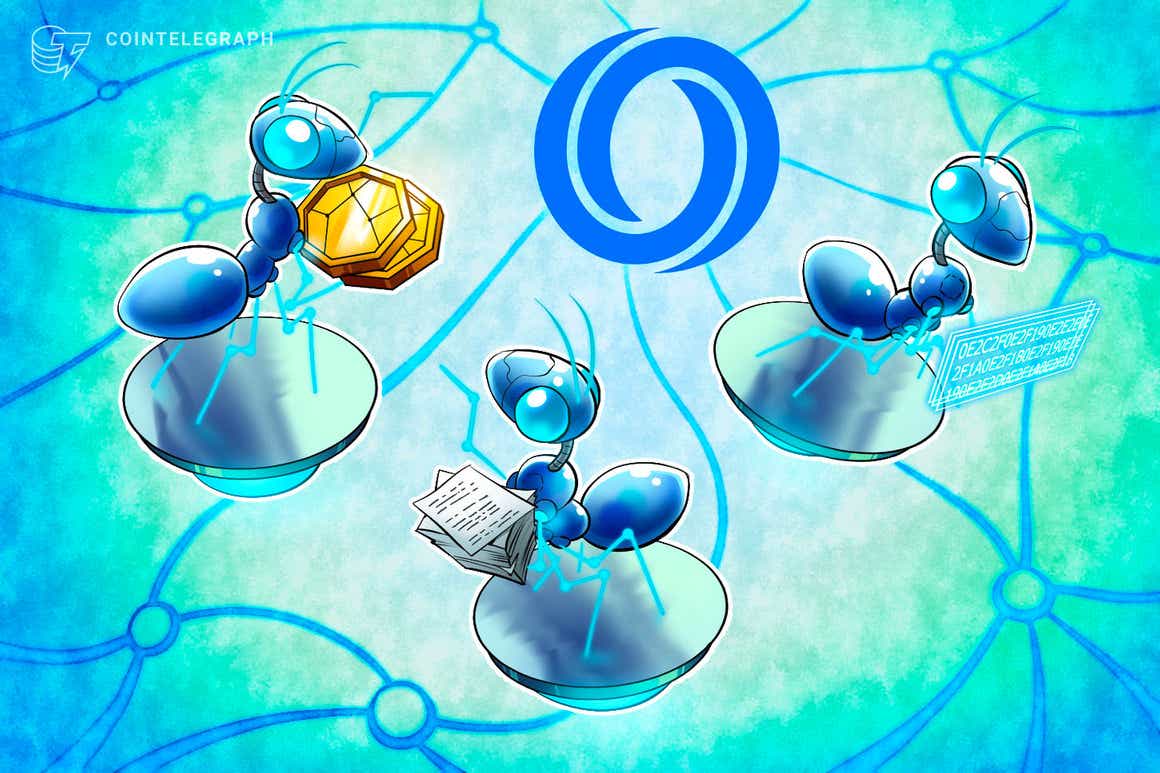High transaction costs have been a thorn in the side of the top blockchain protocols for years as both Bitcoin (BTC) and Ethereum (ETH) have seen the average cost of conducting token transfers skyrocket during times of network congestion and high demand.
One layer-one (L1) protocol that has been gaining traction in recent months that seeks to offer a low-cost solution to high fees is the Oasis Network (ROSE), a privacy-focused L1 blockchain built using the Cosmos SDK and designed for open finance and a responsible data economy.
Data from Cointelegraph Markets Pro and TradingView shows that since hitting a low of $0.169 on Oct. 28, the ROSE price surged 176.5% to a new record high at $0.466 on Nov. 21 and is once again on the move after gaining 70% since Dec. 20.

Three reasons for the building momentum and price for ROSE include the launch of a $160 million Oasis ecosystem fund, the introduction of the first nonfungible token (NFT) project on the network and a rapidly growing community and ecosystem of decentralized applications.
Oasis ecosystem development fund
The most significant development for ROSE that helped jumpstart its price rally was the Nov. 17 announcement revealing a $160 million Oasis ecosystem fund designed to help founders and projects build on the Oasis Network and ecosystem.
The development fund is backed by a host of partners and investors including Draper Dragon, Hashed, FBG and Pantera Capital, and has the goal of helping expand the ecosystem across multiple sectors such as decentralized finance (DeFi), NFTs, Metaverse, data tokenization, data DAOs, data governance and privacy applications.
A major factor attracting projects to Oasis is its built-in privacy features that are designed to support confidential smart contracts; its ability to process transactions for 99% less than the cost on Ethereum adds extra incentive to attract promising applications.
Privacy is especially important in DeFi settings; projects that promote it could help facilitate the migration of stakeholders from centralized finance to decentralized alternatives.
NFTs come to Oasis
A second reason for the building strength of ROSE has been the release of the Oasis AI Rose NFTs, the first NFT project on the network.
Is it a bird — a plane — Superwoman? No, it’s Oasis AI ROSE NFTs dropping from the Metaverse!
If you were Whitelisted for the airdrop, check your wallet to see if you received one of the 1st NFTs built on Oasis
Unboxing occurs on Dec 25, 2021 https://t.co/va54RcCNqm pic.twitter.com/VjK5zVGeyI
— Oasis Foundation (@OasisProtocol) December 23, 2021
To further engage with its community and display the NFT capabilities of the network, 999 AI-generated roses were minted and airdropped to users.
On top of the launch of the first NFT project specifically for Oasis, the network also recently signed a partnership with NFTb, which markets itself as a multi-chain NFT and DeFi platform. NFTb currently offers a curated NFT marketplace specifically designed for digital artists, gamers, and music enthusiasts, as well as a first-of-its-kind dual NFT and token launchpad designed to help creators launch their projects.
Related: The Metaverse will bring unbridled evolution to NFTs
An expanding ecosystem
A third factor helping boost the price of ROSE is an expanding ecosystem of decentralized applications and a growing community of active users.
On Dec. 16 it was revealed that YuzuSwap, the first decentralized exchange being built on Oasis, had raised $2 million in funding for development in order to become the “cornerstone of the Oasis DeFi ecosystem.â€
The network also recently got its first generalized project launchpad with the release of LaunchGarden, a platform that will give projects building on Oasis access to its expanding community as a way to attract early adopters.
LaunchGarder will also allow users to stake their ROSE or participate in airdrops for early access to the projects that launch on the platform.
Introducing LaunchGarden — The 1st launchpad connecting the Oasis Community & Ecosystem!
Everyone can use & build on the Oasis Network, LaunchGarden will give Oasis projects easy access to early users with a multitude of features like staking & airdrops.https://t.co/diQnrjp6hp pic.twitter.com/gVXlcBkOdW
— Oasis Foundation (@OasisProtocol) December 22, 2021
Oasis has also benefited from the Nov. 22 Mainnet launch of Emerald, an Ethereum Virtual Machine compatible ParaTime solution that will enable the bridging of tokens between Ethereum and the Oasis network.
As a result of the growth in applications on Oasis, the network’s community of supporters has now surpassed 100,000 users and shows no signs of slowing down as new projects continue to be launched.
VORTECSâ„¢ data from Cointelegraph Markets Pro began to detect a bullish outlook for ROSE on Nov. 29, prior to the recent price rise.
The VORTECSâ„¢ Score, exclusive to Cointelegraph, is an algorithmic comparison of historical and current market conditions derived from a combination of data points including market sentiment, trading volume, recent price movements and Twitter activity.

As seen in the chart above, the VORTECSâ„¢ Score for ROSE climbed into the green zone on Nov. 29 and reached a high of 76 around one week before the token’s 100% price run over the next three weeks.
The views and opinions expressed here are solely those of the author and do not necessarily reflect the views of Cointelegraph.com. Every investment and trading move involves risk, you should conduct your own research when making a decision.






